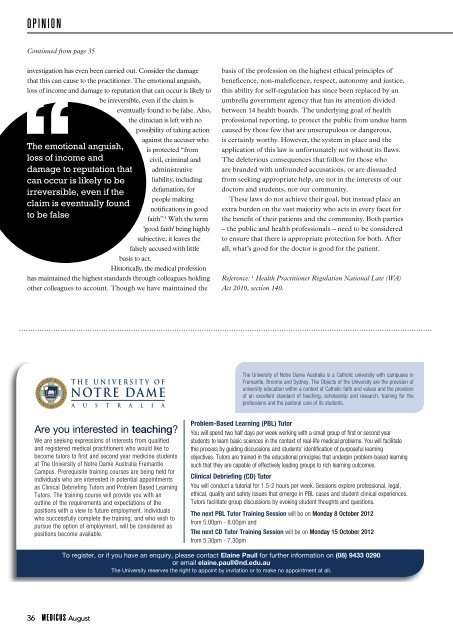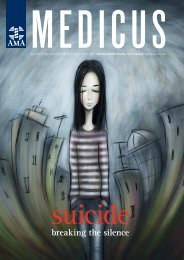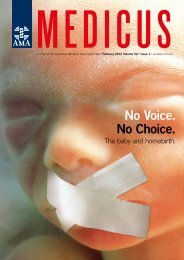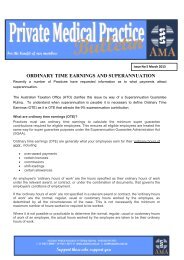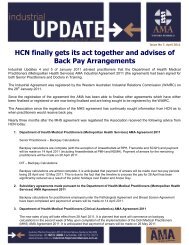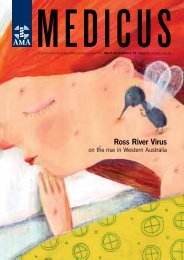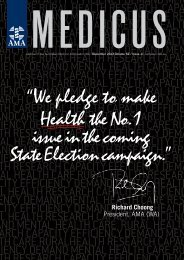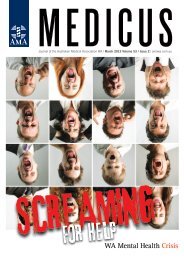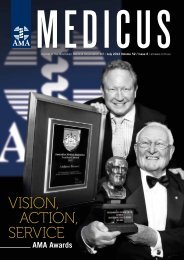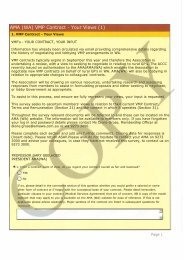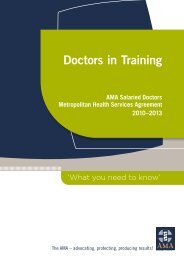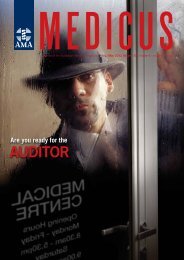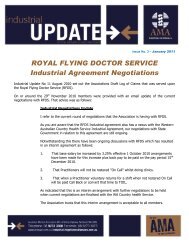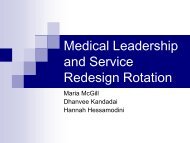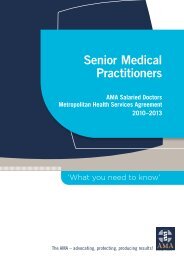twrama 1841_august_2.. - AMA WA
twrama 1841_august_2.. - AMA WA
twrama 1841_august_2.. - AMA WA
You also want an ePaper? Increase the reach of your titles
YUMPU automatically turns print PDFs into web optimized ePapers that Google loves.
OPINION<br />
Continued from page 35<br />
investigation has even been carried out. Consider the damage<br />
that this can cause to the practitioner. The emotional anguish,<br />
loss of income and damage to reputation that can occur is likely to<br />
be irreversible, even if the claim is<br />
eventually found to be false. Also,<br />
the clinician is left with no<br />
possibility of taking action<br />
The emotional anguish,<br />
loss of income and<br />
damage to reputation that<br />
can occur is likely to be<br />
irreversible, even if the<br />
claim is eventually found<br />
to be false<br />
against the accuser who<br />
is protected “from<br />
civil, criminal and<br />
administrative<br />
liability, including<br />
defamation, for<br />
people making<br />
notifications in good<br />
faith”.1 With the term<br />
'good faith' being highly<br />
subjective, it leaves the<br />
falsely accused with little<br />
basis to act.<br />
Historically, the medical profession<br />
has maintained the highest standards through colleagues holding<br />
other colleagues to account. Though we have maintained the<br />
basis of the profession on the highest ethical principles of<br />
beneficence, non-maleficence, respect, autonomy and justice,<br />
this ability for self-regulation has since been replaced by an<br />
umbrella government agency that has its attention divided<br />
between 14 health boards. The underlying goal of health<br />
professional reporting, to protect the public from undue harm<br />
caused by those few that are unscrupulous or dangerous,<br />
is certainly worthy. However, the system in place and the<br />
application of this law is unfortunately not without its flaws.<br />
The deleterious consequences that follow for those who<br />
are branded with unfounded accusations, or are dissuaded<br />
from seeking appropriate help, are not in the interests of our<br />
doctors and students, nor our community.<br />
These laws do not achieve their goal, but instead place an<br />
extra burden on the vast majority who acts in every facet for<br />
the benefit of their patients and the community. Both parties<br />
– the public and health professionals – need to be considered<br />
to ensure that there is appropriate protection for both. After<br />
all, what’s good for the doctor is good for the patient.<br />
Reference: 1 Health Practitioner Regulation National Law (<strong>WA</strong>)<br />
Act 2010, section 140.<br />
The University of Notre Dame Australia is a Catholic university with campuses in<br />
Fremantle, Broome and Sydney. The Objects of the University are the provision of<br />
university education within a context of Catholic faith and values and the provision<br />
of an excellent standard of teaching, scholarship and research, training for the<br />
professions and the pastoral care of its students.<br />
Are you interested in teaching?<br />
We are seeking expressions of interests from qualified<br />
and registered medical practitioners who would like to<br />
become tutors to first and second year medicine students<br />
at The University of Notre Dame Australia Fremantle<br />
Campus. Prerequisite training courses are being held for<br />
individuals who are interested in potential appointments<br />
as Clinical Debriefing Tutors and Problem Based Learning<br />
Tutors. The training course will provide you with an<br />
outline of the requirements and expectations of the<br />
positions with a view to future employment. Individuals<br />
who successfully complete the training, and who wish to<br />
pursue the option of employment, will be considered as<br />
positions become available.<br />
Problem-Based Learning (PBL) Tutor<br />
You will spend two half days per week working with a small group of first or second year<br />
students to learn basic sciences in the context of real-life medical problems. You will facilitate<br />
this process by guiding discussions and students’ identification of purposeful learning<br />
objectives. Tutors are trained in the educational principles that underpin problem-based learning<br />
such that they are capable of effectively leading groups to rich learning outcomes.<br />
Clinical Debriefing (CD) Tutor<br />
You will conduct a tutorial for 1.5-2 hours per week. Sessions explore professional, legal,<br />
ethical, quality and safety issues that emerge in PBL cases and student clinical experiences.<br />
Tutors facilitate group discussions by evoking student thoughts and questions.<br />
The next PBL Tutor Training Session will be on Monday 8 October 2012<br />
from 5.00pm - 8.00pm and<br />
The next CD Tutor Training Session will be on Monday 15 October 2012<br />
from 5.30pm - 7.30pm<br />
To register, or if you have an enquiry, please contact Elaine Paull for further information on (08) 9433 0290<br />
or email elaine.paull@nd.edu.au<br />
The University reserves the right to appoint by invitation or to make no appointment at all.<br />
36 MEDICUS August


